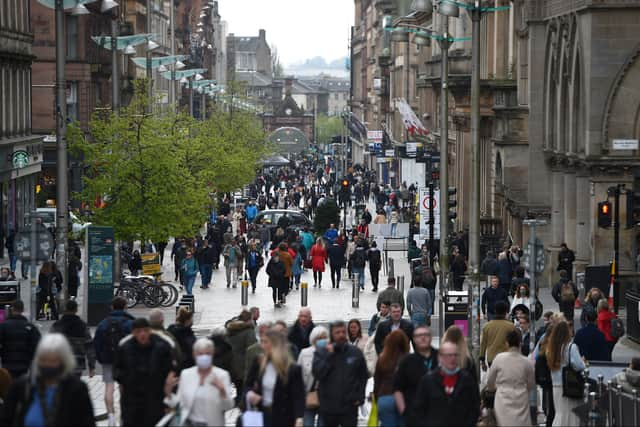People in Glasgow walk more than any other UK city, research finds
and live on Freeview channel 276
A survey found that 86% of Glaswegians sometimes walk for exercise or leisure - two per cent more than second place Brighton, and 10 per cent ahead of folk in Edinburgh.
What does the national data show?
Over a fifth (22 per cent) of the UK population never walk for exercise or leisure at all – and nearly half of people (46 per cent) never walk to or for work, according to the new research for National Walking Month.
Advertisement
Hide AdAdvertisement
Hide AdA survey commissioned by Living Streets, the UK charity for everyday walking, found that Nottingham is the city with the lowest proportion of people (68 per cent) who ever head out to get some exercise by walking.
Brighton, Liverpool, Sheffield and Cardiff are also in the top five cities for walking. But Plymouth, Manchester, Bristol and Newcastle come in the bottom five.


The new data shows that two thirds of the whole UK population (68%) claim to walk for at least 20 minutes each day for exercise or leisure.
Why are people walking or not walking?
National Walking Month, which is organised by Living Streets every May, is this year encouraging everyone to #Try20, and walk for 20 minutes each day. Walking is an easy and accessible way to improve physical and mental health. A 20-minute walk can reduce the risk of preventable health conditions including certain cancers, depression, heart disease and Type 2 diabetes.
Advertisement
Hide AdAdvertisement
Hide AdThe survey has also revealed that a third of people (32%) say they have less time for walking now than they did during lockdown, because they are socialising more. Nearly half of people (46 per cent) feel guilty for walking less now that lockdown is over.
According to Living Streets’ survey, the biggest motivators for people to get out and walk are fresh air (46 per cent), to maintain fitness and physical health (36 per cent) and to improve mental health and wellbeing (35 per cent).
Other reasons for walking are to lose weight (29 per cent), to connect with nature (21 per cent) and to exercise my pet (19 per cent).
People find the biggest barriers to walking to be bad weather (50 per cent) and concerns about not feeling safe walking alone (19 per cent). Other reasons for not walking include not having time (16 per cent), concerns about e-scooters (11 per cent), air pollution (11 per cent) and traffic (10 per cent).
Advertisement
Hide AdAdvertisement
Hide AdOver half of people say they notice an effect on their weight if they don’t walk (52 per cent) or notice an effect on their mental health (53 per cent).
‘Good for our minds, bodies and our neighbourhoods’
Stephen Edwards, chief executive, Living Streets said: “It is encouraging that two thirds of us walk for at least 20 minutes a day. But it is very concerning that so many people never walk for exercise or leisure at all – and such a high proportion of people don’t walk to or for work.
“Walking is good for our minds, our bodies and our neighbourhoods. Walking for short journeys, instead of driving, helps to reduce congestion, road danger and air pollution. Even a short, brisk walk can have fantastic mental and physical health benefits, helping to prevent long-term chronic health conditions such as type 2 diabetes, heart disease and depression and improving the management of existing conditions.
“Walking is a great way to exercise and socialise at the same time. Active people report higher levels of mental wellbeing and are more likely to be satisfied with their life, feel happier and less anxious – and walking together can reduce feelings of loneliness and isolation. With lockdown restrictions lifted and the weather getting nicer, it’s time for us to walk back together.”
Comment Guidelines
National World encourages reader discussion on our stories. User feedback, insights and back-and-forth exchanges add a rich layer of context to reporting. Please review our Community Guidelines before commenting.
